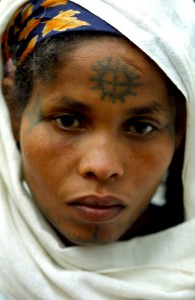Tens of thousands practice in secret as a result of centuries of persecution; now they are divided over going public

ADDIS ABABA, Ethiopia — Tedros, his wife, his 7-year-old daughter and his parents cannot stop the accusations of witchcraft. Despite holding reconciliatory meetings with community members in their village in Ethiopia’s Amhara region, their names and the names of other Jews continue to surface during Christian exorcism ceremonies.
During these ceremonies, an Ethiopian Orthodox Christian priest pours water over the huddled, naked bodies of those believed to be possessed by budas, or evil spirits. They turn maniacal and cry out the name of the buda they believe possesses them.
“They will shout, ‘I am Tedros! I saw this person walking, and I sucked their blood!’” he said. “‘Now I am in this person!’” Once a person is named as a buda and condemned, threats of violence from the Christian majority begin trickling in. Tedros and other Ethiopian Jews spoke on condition of anonymity because of fear of reprisal.
Like many Jews in Ethiopia, Tedros spent most of his youth involved with causes he didn’t believe in. He joined the Orthodox Christian Church when he was 5 to deflect suspicions of his Jewishness. Now 57, he still publicly pretends to be a Christian.
As a young man, he was forced to enlist in Ethiopia’s army to defend the brutal Derg government in the 1980s. Led by Mengistu Hailemariam, the regime created an atmosphere of terror by executing students, teachers and political activists believed to support opposition parties and strewing their bodies in public areas. Instead of fighting, Tedros ran away to Kenya, where he remained for 15 years before returning to Ethiopia at the start of the millennium.
The Derg was replaced by the iron-fisted Ethiopian People’s Revolutionary Democratic Front in 1991, after years of fighting, and Ethiopia is now one of the fastest-growing economies in the world. The national zeitgeist against Jews, however, has stayed much the same. Jews in North Wollo, the province where he and his family live, were persecuted when he left, he said, and they are still being persecuted there.
Jews have a quiet but central presence in Ethiopia’s history. Their origins are disputed, but it is believed they arrived less than 3,000 years ago, around the time King Menelik I, the son of the queen of Sheba and King Solomon, traveled from Israel to the Horn of Africa.
In Ethiopia, particularly in poorer rural areas outside the capital, Addis Ababa, their marginalization is a product of widespread belief that they are agents of evil. Common superstitions are that Jews shoot fire from their eyes, use Christian corpses to make their pottery and turn into hyenas at night.
Al Jazeera spoke to more than a dozen Jewish Ethiopians, researchers and historians who described these lingering beliefs as well as occasional violence in the Amhara and Tigray regions where they have been historically concentrated.
Some said incidents of houses razed with Jewish families still inside them and revenge killings when a death in the community is blamed on Jewish “sorcery” occurred as recently as May. A representative at the Ministry of Justice said it has not received complaints of discrimination or violence from the Jewish community, and the allegations could not be independently verified.
Still, many said the last decade has seen increasing religious tolerance in Ethiopia, particularly in the minor gains in government recognition of a mostly underground Jewish sect that calls itself the Beta Avraham.
Beta Avraham
In the neighborhood of Kechene in northern Addis Ababa, a group of young, college-educated Ethiopians sat on cowhide benches in the corner of one of the city’s two licensed synagogues, established in 2011. As the sun set, neighbors filed in to ready for Shabbat. About 30 people packed the humble room.
They were engineers, aid workers, biology teachers and jewelry shop owners. The youngest were fresh from class at Addis Ababa University, notebooks in hand, and as one of them swiped back and forth on his smartphone, app icons glided across a photo of Israeli Prime Minister Benjamin Netanyahu. Like Tedros, they are members of the Beta Avraham, a sect of Jews that split from the Beta Israel Jewish majority sometime in the 18th or 19th century through feigned conversions to Christianity.
Historically this sect wore wooden crosses in public and attended church with their neighbors, but behind closed doors they donned kippahs and swore on the Torah. In hiding their religion, they avoided the violence that plagued their ancestors and have been able to take advantage of opportunities previously closed to them because of the stigmas attached to their faith.
“It was clearly an economic breakaway from the Beta Israel,” said Dr. Lucy Steinitz, an American aid worker who spent three years visiting the synagogue. “They were practicing Christianity on the outside but retained some Jewish customs behind closed doors or inside caves. Over the years, that dissipated, and [customs have] been really difficult to maintain, especially in a relatively low-literate society.”
Daniel, the leader in this community, is one of a new generation of Beta Avraham who wants to reverse that norm. He is leading, for the first time in their history, a push for his people to step out into the public and embrace their Jewish heritage.
To read more click here
Source: Al Jazeera


